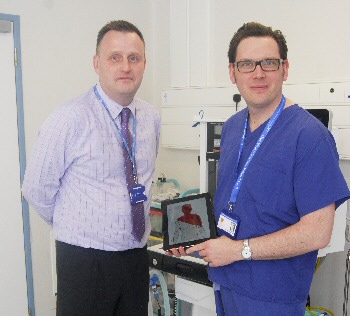|
Leading North West
doctor welcomes new medical apps guidance

A leading North West doctor has
welcomed new guidance on healthcare mobile apps, the 1st time a document has
laid out the steps necessary to commission, develop and acquire a medical
app in the UK.
There are now more than 100,000 apps for healthcare in a rapidly growing
market based on the increasing use of smartphones, tablets and wearable
devices.
Guidance on which health apps to use has been sponsored by the North West
Coast Academic Health Science Network, who are an agency for innovation in
healthcare.
This guidance has lead to an app, which calculates burn area percentages,
helping to accurately prescribe treatment, becoming the 1st app to be
recognised as a medical device, called:- 'Mersey Burns.'
Mr Pritchard Jones, who is a Consultant in Burns and Plastics at St Helens
and Knowsley Teaching Hospitals NHS Trust worked with a former Army medic to
produce the multi award winning:- 'Mersey Burns app.'
Mr Rowan Pritchard Jones said that he thinks the guidance would be welcomed
by all busy health staff looking for ways to improve efficiency:-
"There is a lot of digital innovation in the North West and there's a lot we
can do with apps to support patient care. But we have to know that it is
keeping patient data secure and reinforcing good habits in information
governance. We need to be driving good practice. Also, clinicians need to be
at the heart of developments to make sure new apps remain clinically
relevant to patient care. If it is created for the NHS by the NHS then they
are likely to be good."
Declan Hadley, Digital Health Lead for the North West Coast Academic Health
Science Network, said:- "Apps are going to be an increasing part of
patient care in the future. This guidance will provide patients with the
opportunity to be more active participants in their health and wellbeing.
The guidance is an important part in the process to ensuring the apps we use
are developed in partnership with patients and clinicians and are safe and
secure."
The work was carried out in response to detailed research by Charles Lowe,
Managing Director of Digital Health and Care Alliance, into the reasons why
medical apps were not being recommended to patients by clinicians. Mr Lowe
told us that:- "The main reason for this was lack of confidence in the
efficacy of medical apps, underlined by the absence of any NICE guidance on
the topic. A further issue is the uncertainty and doubt among app developers
and commissioners as to the steps necessary to commission and develop
medical apps in line with the many different regulatory considerations.
Although most developers were aware of medical device legislation, the
research revealed that many were unaware of the personal data privacy
regulations, or of the need to have evidence of efficacy, before advertising
health related benefits."
The guidance now for both clinicians and patients to check before they
download, was compiled by the Digital Health and Care Alliance (DHACA.Org.UK).
It is now available
online or you can also download the
guidance from our site by clicking on
here...
|
